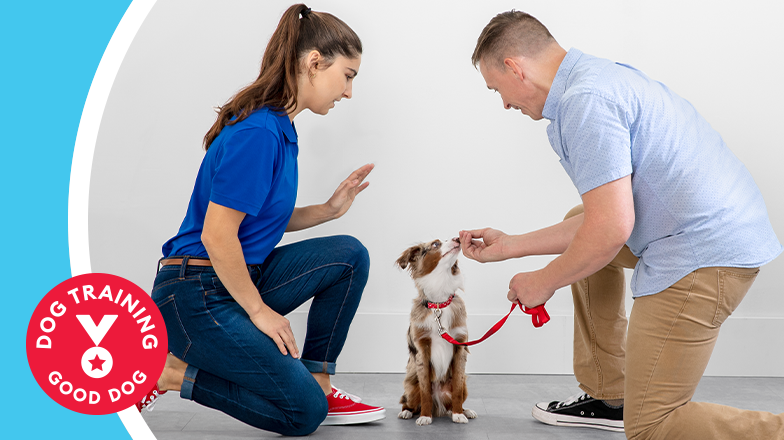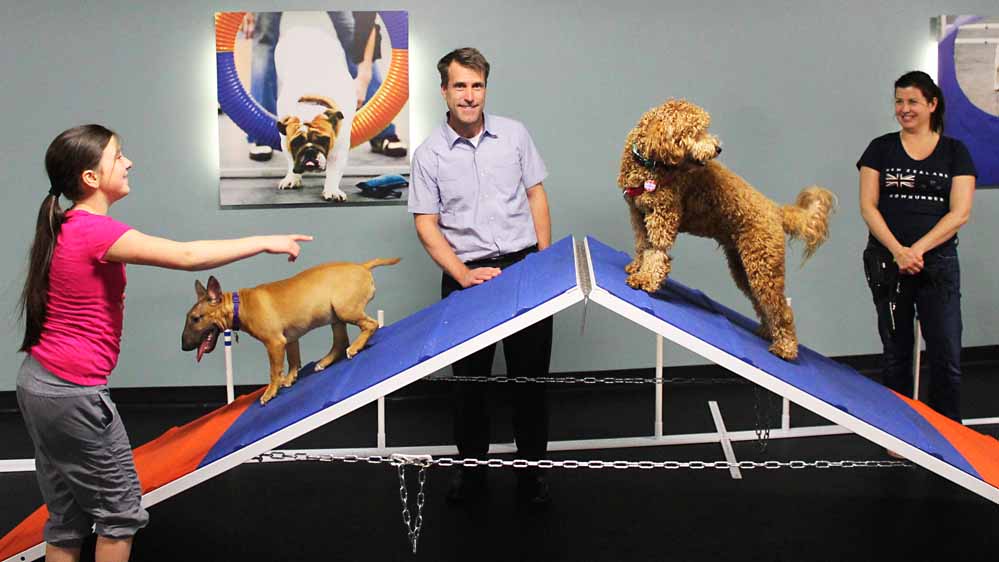Dog Training Near Me: Strategies to Handle Aggression Safely
Crucial Tips and Techniques for Learning Dog Educating at Home
Understanding canine training in your home needs a calculated method. Persistence, positivity, and uniformity are crucial components. Developing a routine aids produce a complacency for the canine. Making use of positive reinforcement develops trust and communication. Many owners have a hard time with maintaining rate of interest and engagement during training sessions. Recognizing exactly how to browse these challenges can result in extra effective training results. What techniques could be most useful in getting over these common challenges?
Develop a Consistent Regimen
When educating a pet, establishing a constant regimen is essential for cultivating etiquette and a strong bond between the proprietor and pet dog. A structured timetable provides dogs with a sense of safety, aiding them understand what to expect every day. Normal feeding times, workout, and training sessions develop a predictable environment, which can lower stress and anxiety and advertise a feeling of security.
Proprietors need to intend to incorporate daily activities at the same time to reinforce this routine. As an example, morning walks, playtime, and training workouts must happen constantly. Additionally, including commands and hints throughout these tasks can additionally boost learning.
Use Favorable Support
A constant regular prepares for reliable training, however the methods used throughout training sessions significantly influence a pet dog's discovering experience. Positive support arises as an effective tool fit desired habits. This technique includes compensating a pet for displaying details actions, efficiently motivating them to repeat those actions (Dog Training Near Me). Benefits can include deals with, appreciation, or play, producing a positive organization with the action performed
Making use of positive support promotes a bond of trust in between the canine and instructor, enhancing interaction and understanding. It is critical to provide rewards immediately after the wanted habits to enhance the connection. Uniformity in applying this strategy guarantees the dog can plainly associate the habits with the incentive. Moreover, avoiding punishment or negative reinforcement can bring about a more enthusiastic and positive student. By concentrating on favorable reinforcement, trainers can develop a helpful setting where dogs prosper and find out efficiently.
Maintain Training Procedure Short and Fun
Efficient pet training requires keeping sessions engaging and short to preserve the pet dog's focus and excitement. Usually, sessions need to last no more than 10 to 15 mins, as dogs have restricted focus periods. By concentrating on brief intervals, fitness instructors can avoid frustration for both the trainer and the dog, enhancing the finding out experience.
Integrating play and positive interactions into training can make sessions pleasurable. Utilizing toys, deals with, or appreciation as incentives not just encourages the pet yet also strengthens the bond between the animal and fitness instructor. Altering activities frequently can likewise help maintain the dog's rate of interest to life, as varied jobs boost psychological interaction.
Ending each session on a positive note, such as commemorating a tiny success, ensures the dog associates training with enjoyable. Inevitably, maintaining training sessions short and pleasurable advertises efficient learning and reinforces the total training process.
Set Realistic Goals
Establishing realistic objectives is crucial for effective canine training. Trainers need to start by examining their canine's behavioral tendencies and existing abilities, allowing them to develop achievable purposes. Rather than aiming for intricate commands, starting with standard hints like "rest" or "stay" can promote a sense of achievement.
Additionally, damaging down larger objectives right into smaller, convenient steps aids maintain inspiration for both the trainer and the pet dog. This method additionally permits changes along the method, guaranteeing that difficulties do not come to be overwhelming.
Moreover, it is necessary to identify that each canine discovers at its very own pace; persistence is vital. Keeping expectations based aids prevent disappointment and urges consistent progress. Dog Training Near Me. In conclusion, establishing practical goals not just boosts the training experience but also enhances the bond in between the pet and the trainer, bring about an extra harmonious and effective training trip
Mingle Your Pet dog
Attaining practical training objectives prepares for a well-rounded canine, but socialization plays a significant role in a canine's find more info development. Interacting socially a pet dog includes subjecting it to different environments, individuals, and other pets, which helps to construct confidence and decrease anxiousness. Early socialization, ideally in between 3 and fourteen weeks of age, is vital for shaping a pet's actions and character. This direct exposure permits pet dogs to discover suitable interactions and create crucial social skills.
Owners should present their pet dogs to different situations gradually, ensuring each experience is rewarding and favorable. Going to parks, attending pup classes, or preparing playdates with various other canines can promote these communications. Additionally, observing various other dogs and finding out from their behaviors can better improve a pet's social skills. Ultimately, constant and positive socialization cultivates a well-adjusted pet dog that easily navigates numerous social settings throughout its life.
Be Person and Persistent

Perseverance is important. Normal practice strengthens actions and commands, ensuring that the pet dog preserves what has been discovered. It is very important to celebrate little triumphes, as they encourage both the owner and the pet to keep advancing. Recognizing setbacks as part of the trip instead of failings can help preserve inspiration. Inevitably, a patient and consistent technique not just develops a more powerful bond between canine and owner yet additionally lays the structure for reliable training and long lasting obedience.

Incorporate Educating Into Every Day Life
Incorporating training into every day life can boost a canine's learning experience. Routine tasks, such as feeding or strolling, present important opportunities for favorable a knockout post reinforcement. By effortlessly blending training with daily activities, proprietors can grow far better habits in their pets gradually.
Daily Regimen Assimilation
Exactly how can pet owners effortlessly blend training into their day-to-day routines? By integrating training sessions right into day-to-day activities, owners can improve their pet's knowing experience. For example, simple commands can be practiced throughout strolls, such as "sit" prior to crossing streets or "heel" while steering through parks. Feeding time presents another chance; proprietors can include commands like "wait" or "leave it" before presenting the food bowl. In addition, play can work as a training ground for commands like "fetch" or "drop it." Consistency is essential; by embedding training right into regular tasks, canines find out that commands are pertinent in numerous contexts. This approach not only reinforces discovering however likewise enhances the bond in between the dog and its proprietor.
Favorable Support Opportunities
Educating possibilities are plentiful throughout a pet's day-to-day life, especially when combined with favorable support strategies. Day-to-day tasks supply minutes for training, such as during walks, feeding times, or play sessions. Rewarding a canine for sitting prior to obtaining food improves obedience while promoting a positive organization with commands. Likewise, applauding a dog for calmly welcoming visitors strengthens desirable behavior. Incorporating training into play, like utilizing fetch to exercise commands, can additionally work. Owners should continue to be constant, using deals with, praise, or toys as rewards to urge etiquette. By incorporating training effortlessly into daily regimens, proprietors can cultivate a mannerly canine while discover this info here reinforcing their bond, making the training procedure satisfying for both events.
Frequently Asked Concerns
What Age Is Best to Beginning Training My Pet?
Establishing the very best age to begin educating a pet differs; nevertheless, professionals typically advise starting around 8 weeks. Early training promotes socializing, establishes regimens, and helps shape favorable behaviors, advertising a well-adjusted, obedient buddy.
Just How Can I Stop My Pet Dog From Barking Exceedingly?
To lower too much barking, one effective technique entails identifying triggers, supplying regular training commands, and gratifying peaceful habits. In addition, regular exercise and psychological excitement can help lessen unnecessary barking by dealing with monotony or anxiety.
What Should I Do if My Pet Becomes Aggressive?
When a pet dog presents aggression, it is necessary to stay tranquil and stay clear of confrontation. Determining triggers, looking for specialist help, and utilizing favorable support strategies can efficiently handle and minimize hostile actions in dogs.
How Do I Choose the Right Training Tools?
Selecting the appropriate training devices entails evaluating the dog's size, temperament, and training goals. Research various alternatives, speak with experts, and prioritize humane, effective devices that promote positive reinforcement for a successful training experience.

Can I Train My Pet Dog Without Specialist Aid?
Training a pet dog without specialist help is practical for several owners. With dedication, perseverance, and consistent practice, individuals can properly teach basic commands and strengthen favorable behaviors, promoting a solid bond in between them and their pet dog.
A consistent routine lays the groundwork for efficient training, but the approaches utilized throughout training sessions significantly influence a pet dog's understanding experience. Reliable pet dog training calls for keeping sessions appealing and short to preserve the pet's attention and enthusiasm. Achieving reasonable training goals lays the groundwork for an all-around canine, however socializing plays a substantial duty in a pet's growth. Furthermore, observing other pet dogs and finding out from their behaviors can even more enhance a dog's social skills. Choosing the best training tools involves evaluating the pet's training, size, and temperament objectives.